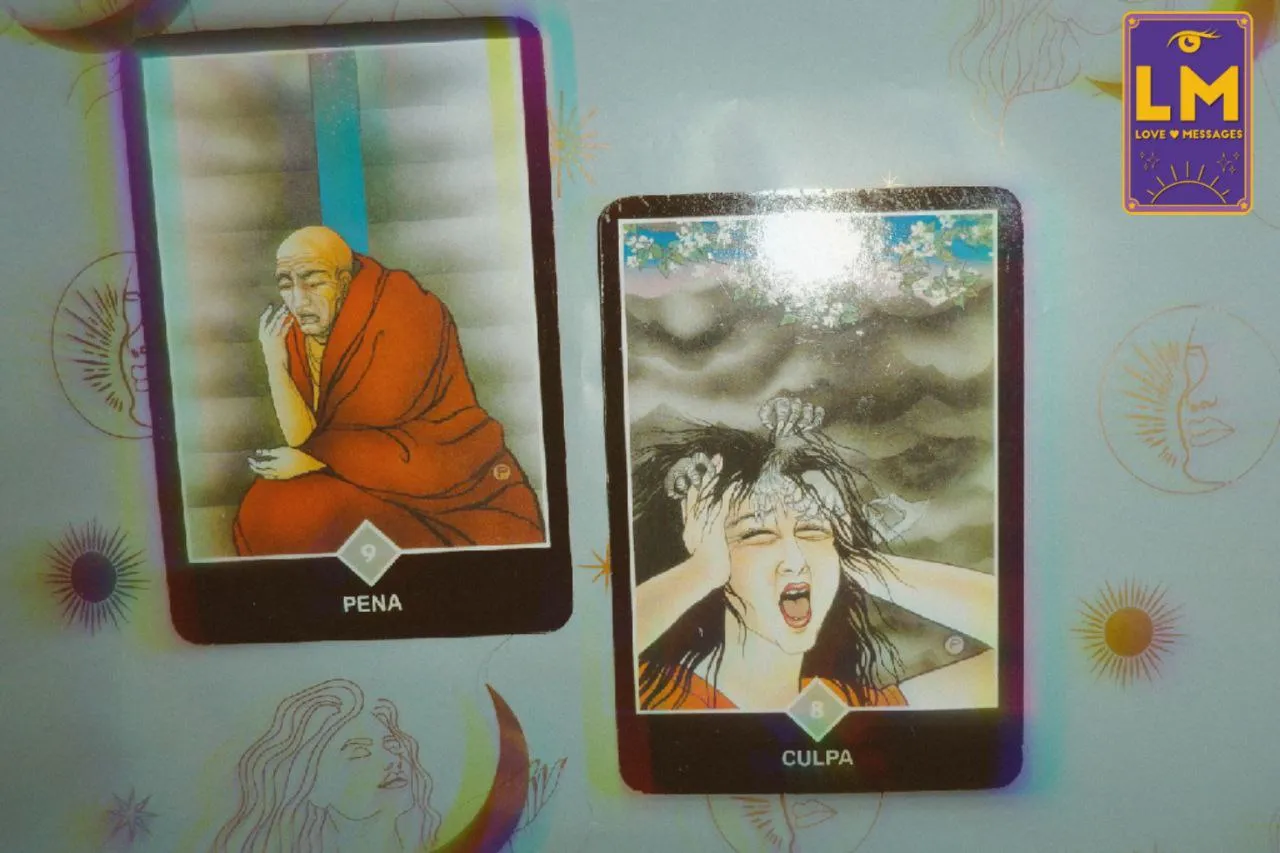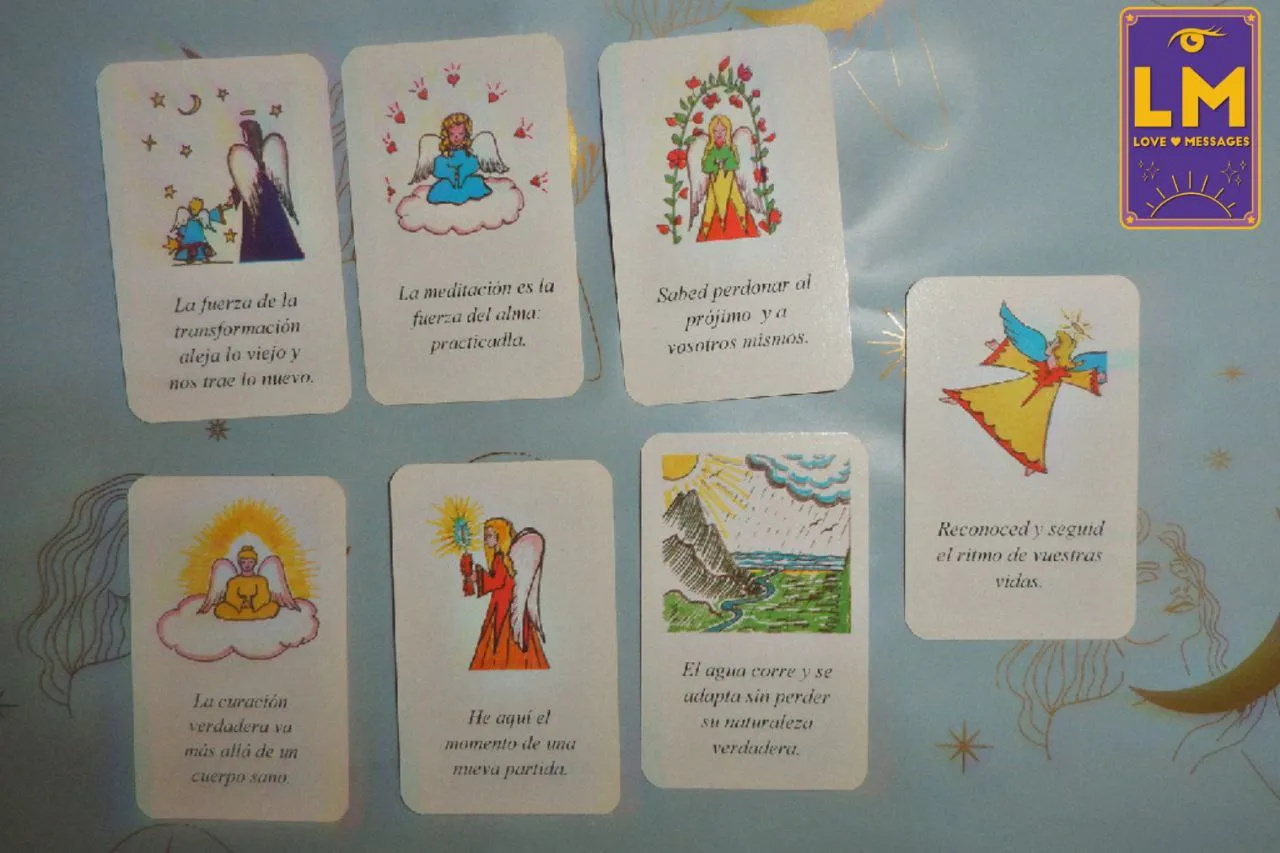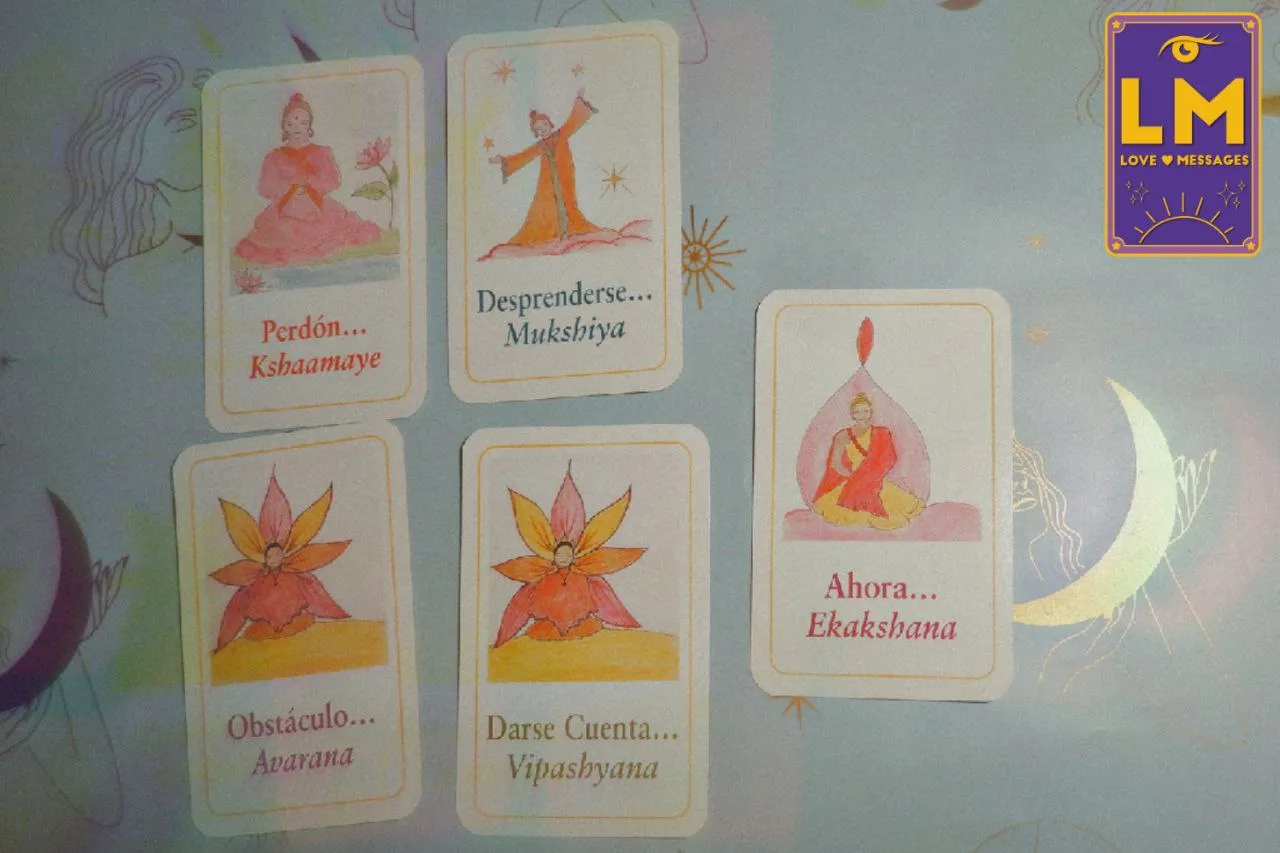El sentido del sufrimiento es profundo e invita a la contemplación. 👁️ La elección de abordar el tema desde varias perspectivas, como la conexión entre el sufrimiento y la felicidad, así como la relación entre el dolor y el sufrimiento, añade complejidad al análisis. La forma en que enfrentamos y procesamos las experiencias dolorosas puede determinar si nos sumergimos en el sufrimiento o no. La noción de que a veces nos aferramos al sufrimiento, ya sea por hábito o por una especie de comodidad en la incomodidad, es un recordatorio intrigante de la complejidad de la psique humana... Además, la comprensión errónea de la depresión es algo que, lamentablemente, persiste, y tu observación destaca la importancia de abordar estos temas con sensibilidad y comprensión.

Analizando desde las perspectivas de algunas cartas...
Podemos analizar desde diversas perspectivas, por ejemplo: La pena y la culpa son emociones complejas que pueden desempeñar un papel significativo en el sufrimiento humano. Reflexionar sobre la naturaleza de la pena y cómo se procesa emocionalmente.¨ ¿Es la pena una reacción temporal a circunstancias adversas, o hay una resistencia a dejarla ir? ¿Cómo se puede aprender y crecer a través de la experiencia de la pena? Además, el sufrimiento está vinculado a la culpa autoimpuesta. Pregúntate si hay aspectos en tu vida en los que te estás castigando innecesariamente. ¿Cómo puedes liberarte de la carga de la culpa y permitirte sanar? 👁️🗨️ Son cuestionamientos importantes que nos deberíamos hacer alguna vez en nuestra existencia cuando sentimos sufrimiento.

Algunas cartas ilustran el sufrimiento y además dan apertura a la aceptación de éste, por ejemplo: El Nueve de espadas ⚔️ sugiere sufrimiento mental intenso, a menudo asociado con la preocupación excesiva, el insomnio y los temores irracionales. Puede representar la sensación de estar atrapado en un ciclo de pensamientos negativos. ⚔️ El Diez de espadas indica un sufrimiento más intenso y un punto de quiebre. Puede simbolizar el fin de una situación dolorosa, pero también sugiere que el dolor ha llegado a su punto máximo. Puede representar el agotamiento mental y emocional.
Reflexión personal:
¿En qué área de tu vida sientes un sufrimiento mental abrumador?
¿Hay preocupaciones específicas que te estén afectando de manera significativa?
¿Te sientes atrapado en pensamientos negativos o en un ciclo de ansiedad?
Aceptación de la situación:
¿Es posible que estés resistiendo o evitando enfrentar la realidad de una situación difícil?
¿Hay aspectos de tu vida en los que te estás aferrando a la angustia en lugar de buscar soluciones?
Buscar apoyo:
¿Has buscado apoyo emocional o profesional para lidiar con tus preocupaciones?
¿Hay personas en tu vida que puedan ofrecer orientación o comprensión?
Transformación y superación:
¿Cómo puedes abordar y transformar tus pensamientos negativos?
¿Qué acciones puedes tomar para superar la situación que está causando sufrimiento?

🫂 El sufrimiento puede ser un catalizador para el crecimiento personal. A través de los desafíos y las dificultades, las personas a menudo desarrollan resiliencia, fortaleza emocional y una mayor comprensión de sí mismas. Este proceso de crecimiento puede contribuir a una forma más profunda y duradera de felicidad. La relación entre el sufrimiento y la felicidad es única para cada individuo, y las experiencias varían enormemente. Algunas personas pueden encontrar sentido y crecimiento a través del sufrimiento, mientras que otras pueden luchar con los efectos negativos. La gestión del sufrimiento y la búsqueda de la felicidad a menudo son aspectos importantes del viaje humano, y cada persona puede abordarlos de manera única.

En la filosofía y práctica del budismo, el sufrimiento juega un papel central y es considerado uno de los Cuatro Nobles Verdades, que son fundamentales para la comprensión de la existencia y la búsqueda de la liberación del sufrimiento. Estas verdades fueron enseñadas por Siddhartha Gautama, el Buda histórico, como la base de su enseñanza.
La Verdad del Sufrimiento (Dukkha): La existencia está marcada por el sufrimiento. Este sufrimiento no se limita solo al dolor físico, sino que incluye la insatisfacción, la frustración y la impermanencia de todas las cosas.
La Verdad del Origen del Sufrimiento (Samudaya): El sufrimiento tiene una causa, que está vinculada al deseo y al apego. El apego a las cosas, la ignorancia y el deseo insaciable son vistos como las raíces del sufrimiento.
La Verdad de la Cese del Sufrimiento (Nirodha): El sufrimiento puede cesar si se eliminan las causas subyacentes, es decir, el deseo y el apego. Al liberarse del deseo y la ilusión, se puede alcanzar la liberación del sufrimiento.
La Verdad del Camino que Conduce al Cese del Sufrimiento (Magga): Para poner fin al sufrimiento, el Buda enseñó el Noble Óctuple Sendero, que es un conjunto de prácticas éticas, mentales y contemplativas. Este camino incluye la comprensión correcta, el pensamiento correcto, la palabra correcta, la acción correcta, el medio de vida correcto, el esfuerzo correcto, la atención plena correcta y la concentración correcta.

Este es un tema que abarca mucho, quise contextualizar en base a mis cartas actuales y espero esta información sea de utilidad para todos mis compañeros ¡Gracias infinitas a @emiliorios por la invitación.

Invito a participar a mis colegas @soyunasantacruz y @soyaruska
The meaning of suffering is deep and invites contemplation. 👁️ The choice to approach the topic from various perspectives, such as the connection between suffering and happiness, as well as the relationship between pain and suffering, adds complexity to the analysis. The way we cope with and process painful experiences can determine whether we immerse ourselves in suffering or not. The notion that we sometimes cling to suffering, whether out of habit or a kind of comfort in discomfort, is an intriguing reminder of the complexity of the human psyche... Furthermore, the misunderstanding of depression is something that , unfortunately, persists, and your observation highlights the importance of approaching these issues with sensitivity and understanding.

Analyzing from the perspectives of some cards...
We can analyze from various perspectives, for example: Grief and guilt are complex emotions that can play a significant role in human suffering. Reflect on the nature of grief and how it is emotionally processed.¨ Is grief? a temporary reaction to adverse circumstances, or is there a resistance to letting go? How can you learn and grow through the experience of grief? Furthermore, suffering is linked to self-imposed guilt. Ask yourself if there are areas in your life where you are punishing yourself unnecessarily. How can you release the burden of guilt and allow yourself to heal? 👁️🗨️ These are important questions that we should ask ourselves at some point in our existence when we feel suffering.

Some cards illustrate suffering and also open the door to accepting it, for example: The Nine of Swords ⚔️ suggests intense mental suffering, often associated with excessive worry, insomnia and irrational fears. It may represent the feeling of being trapped in a cycle of negative thoughts. ⚔️ The Ten of Swords indicates more intense suffering and a breaking point. It can symbolize the end of a painful situation, but it also suggests that the pain has reached its peak. It can represent mental and emotional exhaustion.
Personal reflection:
In what area of your life do you feel overwhelming mental suffering?
Are there specific concerns that are significantly affecting you?
Do you feel trapped in negative thoughts or a cycle of anxiety?
Acceptance of the situation:
Is it possible that you are resisting or avoiding facing the reality of a difficult situation?
Are there aspects of your life where you are holding on to anxiety instead of seeking solutions?
Seek support:
Have you sought emotional or professional support to deal with your concerns?
Are there people in your life who can offer guidance or understanding?
Transformation and improvement:
How can you address and transform your negative thoughts?
What actions can you take to overcome the situation that is causing suffering?

🫂 Suffering can be a catalyst for personal growth. Through challenges and hardships, people often develop resilience, emotional strength, and a greater understanding of themselves. This growth process can contribute to a deeper, more lasting form of happiness. The relationship between suffering and happiness is unique to each individual, and experiences vary greatly. Some people can find meaning and growth through suffering, while others may struggle with the negative effects. Managing suffering and pursuing happiness are often important aspects of the human journey, and each person can approach them uniquely.

In the philosophy and practice of Buddhism, suffering plays a central role and is considered one of the Four Noble Truths, which are fundamental to understanding existence and seeking freedom from suffering. These truths were taught by Siddhartha Gautama, the historical Buddha, as the basis of his teaching.
The Truth of Suffering (Dukkha): Existence is marked by suffering. This suffering is not limited to physical pain alone, but includes dissatisfaction, frustration, and the impermanence of all things.
The Truth of the Origin of Suffering (Samudaya): Suffering has a cause, which is linked to desire and attachment. Attachment to things, ignorance and insatiable desire are seen as the roots of suffering.
The Truth of the Cessation of Suffering (Nirodha): Suffering can cease if the underlying causes, that is, desire and attachment, are eliminated. By freeing yourself from desire and illusion, you can achieve liberation from suffering.
The Truth of the Path that Leads to the Cessation of Suffering (Magga): To end suffering, the Buddha taught the Noble Eightfold Path, which is a set of ethical, mental and contemplative practices. This path includes right understanding, right thought, right speech, right action, right livelihood, right effort, right mindfulness and right concentration.

This is a topic that covers a lot, I wanted to contextualize it based on my current letters and I hope this information is useful to all my colleagues! Endless thanks to @emiliorios for the invitation.
